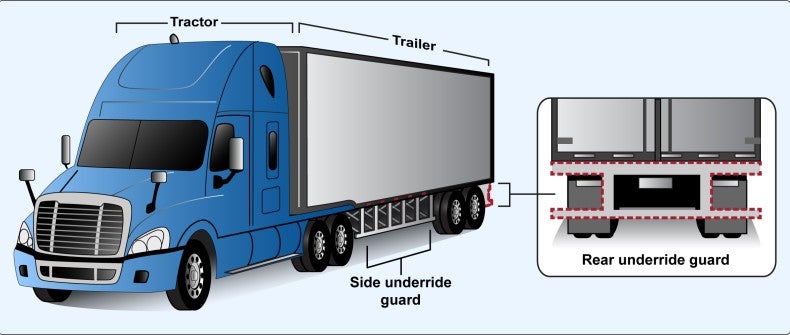Federal regulators are accepting applications for a new 20-member Advisory Committee on Underride Protection (ACUP) to provide advice and recommendations to the U.S. Department of Transportation on safety regulations to reduce truck trailer underride crashes.
Rear underride crashes occur when a passenger vehicle collides with the back of a truck trailer and slides underneath. Such crashes can be so severe that the trailer enters the car’s passenger compartment, severely injuring or killing the occupants.
In a notice filed Wednesday by the National Highway Traffic Safety Administration, the agency provided information on the duties to be performed by the 20-member committee and who is eligible to volunteer. Applications for membership are due in 30 days.
The Secretary of Transportation will appoint each member for the duration of the panel’s two-year charter. It will include two representatives from each of the following categories:
- Truck and trailer manufacturers
- Motor carriers, including independent owner-operators
- Law enforcement
- Motor vehicle engineers
- Motor vehicle crash investigators
- Truck safety organizations
- Insurance industry
- Emergency medical service providers
- Families of underride crash victims
- Labor organizations
“To ensure the recommendations of the committee have considered the needs of diverse groups served by [DOT], the membership of the committee shall, to the extent practicable, include persons with lived experience and knowledge of the needs of underrepresented groups with regard to race, ethnicity, religion, disability, sexual orientation, gender identity and other factors,” according to the notice.
As with NHTSA’s final rule on new underride guard protection standards to be issued shortly, establishment of the ACUP is required under the Infrastructure Investment and Jobs Act (IIJA) signed into law in November 2021.
The IIJA also requires DOT to complete — not later than one year after enactment — additional research on side underride guards to better understand their overall effectiveness.

DOT will be required to “assess, among other matters, the feasibility, benefits, and costs of, and any impacts on intermodal equipment, freight mobility (including port operations), and freight capacity associated with, installing side underride guards on new trailers and semitrailers … and if warranted, develop performance standards for side underride guards,” according to the law.
The Government Accountability Office (GAO) stated in a 2019 report that even though side underride guards are being developed, stress on trailer frames due to the additional weight presents challenges.
“NHTSA has not performed research on the overall effectiveness and cost of these guards, and manufacturers we interviewed told us that they are hesitant to invest in developing side underride guards without such research,” GAO noted.








Mike
The rear bumper assembly needs to be retractable with a type of air bag or some kind of hydraulic assembly that can cushion the blow with out letting the vehicle go underneath the trailer and keep it from being fatal accidents. Thanks Mike
Dan
How about we hold the motoring public responsible for their actions. Don’t drive like an idiot and don’t run into the back of a truck. Study after study has stated that automobiles are responsible for the greater percentage of crashes between automobiles and large commercial vehicles. Why is the public so quick to lay all.of the blame on the trucks? I have been driving trucks for 38 years. I have never hurt anybody. Sustained equipment damage 3 times due to people in automobiles not paying attention. Why should the trucking industry foot the cost to cover for the public stupidity? The trucking industry is not perfect. It does need to clean itself up somewhat.